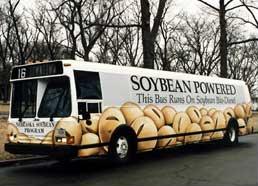 What if the biodiesel you’re buying doesn’t have as much biodiesel as advertised? Or a whole lot more? Well, according to a new analysis of more than 20 distributors and small U.S. retailers, blends sold as 20% biodiesel contained as little as 10% or as much as 74% biodiesel. The study by Christopher Reddy at the Woods Hole Oceanographic Institution and colleagues is published in Environmental Science & Technology.
What if the biodiesel you’re buying doesn’t have as much biodiesel as advertised? Or a whole lot more? Well, according to a new analysis of more than 20 distributors and small U.S. retailers, blends sold as 20% biodiesel contained as little as 10% or as much as 74% biodiesel. The study by Christopher Reddy at the Woods Hole Oceanographic Institution and colleagues is published in Environmental Science & Technology.
The problems are manifold (pun, sadly, intended): from a shaken public confidence to tax credits given in excess of what sellers deserve. Plus, blends containing more than 20% biodiesel can damage hoses and gaskets in cars manufactured before 1993, and can also freeze in cold temperatures. This could plug fuel filters or freeze fuel solid in the tank. The blending problem is most apparent with smaller mom-and-pop retailers mixing it themselves. From ES&T:
The biodiesel industry is trying to rein in the problem, says Amber Pearson, a spokesperson for the National Biodiesel Board, by working with ASTM on standards that will include biodiesel blends. States will then have to adjust their own regulations to include blend verification.
Growing pains, let’s hope.
Julia Whitty is Mother Jones’ environmental correspondent, lecturer, and 2008 winner of the John Burroughs Medal Award. You can read from her new book, The Fragile Edge, and other writings, here.















